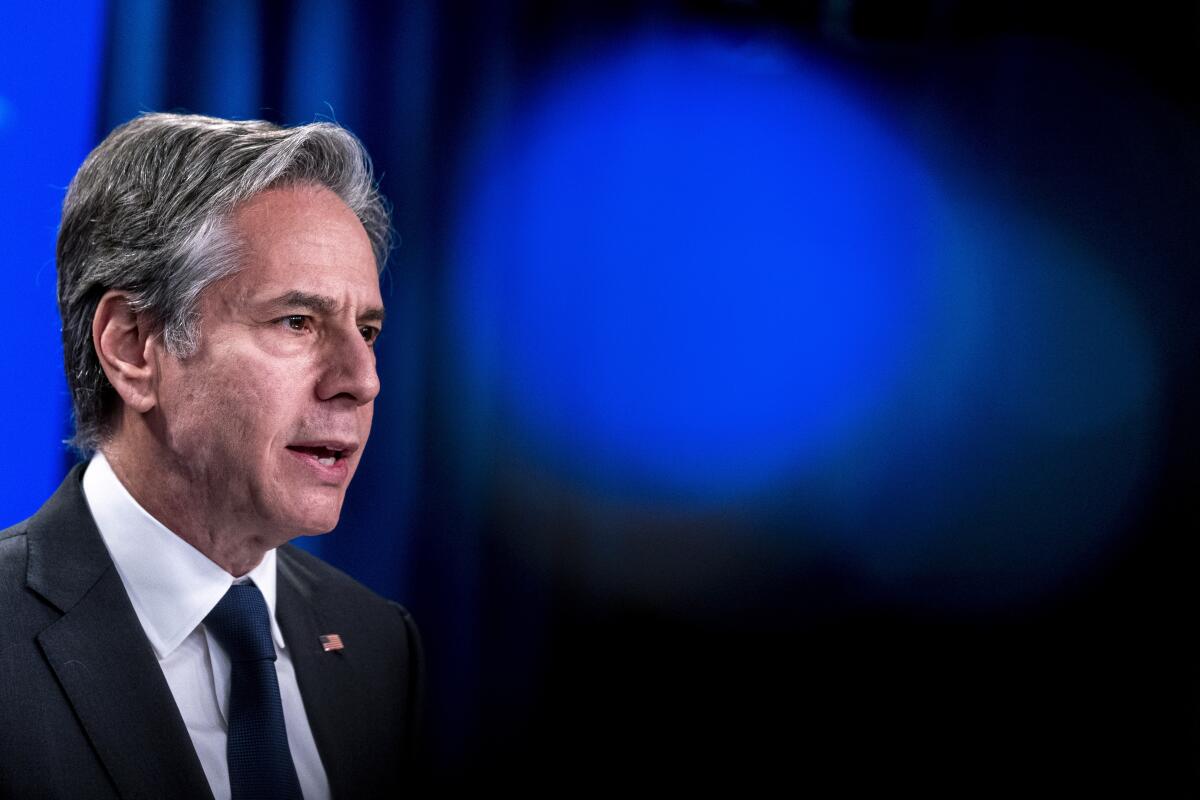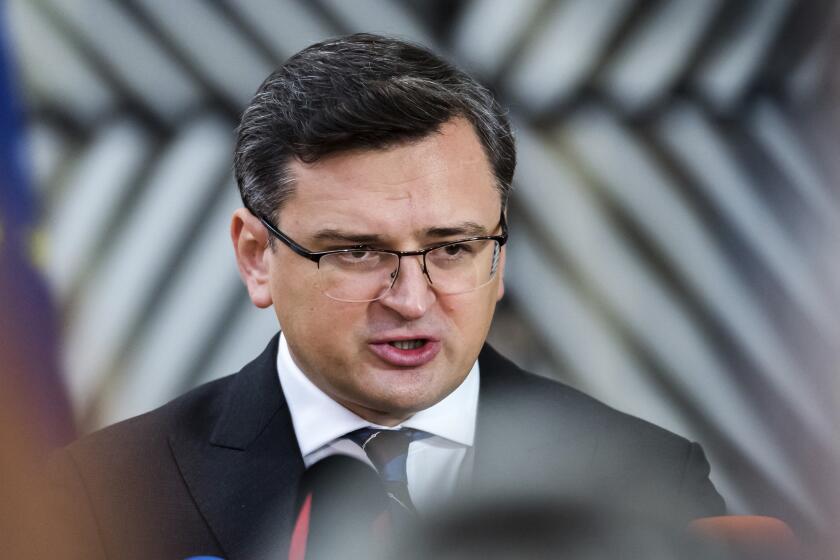U.S. boosts military aid to Ukraine as Russia tensions soar

- Share via
KYIV, Ukraine — As Secretary of State Antony Blinken visits Ukraine, the Biden administration said Wednesday it’s providing an additional $200 million in defensive military aid to the country amid soaring fears of a Russian invasion.
A senior State Department official said the assistance was approved in late December as part of American efforts to help Ukraine protect itself. Until Wednesday, however, the administration had refused to comment on it. The official wasn’t authorized to discuss the matter publicly before Blinken’s meetings in Kyiv and spoke on condition of anonymity.
“We are committed to Ukraine’s sovereignty and territorial integrity and will continue to provide Ukraine the support it needs,” the official said. The official did not detail the contents of the aid package.
The announcement came as Blinken opened a hastily arranged visit to Kyiv as he and other administration officials step up warnings about a possible Russian invasion of Ukraine. The White House said Tuesday that Russia could at any point launch an attack in Ukraine.
In comments to U.S. Embassy staff in Kyiv, Blinken went further by saying that Russian President Vladimir Putin has plans to significantly enhance Moscow’s military presence near Ukraine’s border, which now numbers roughly 100,000 troops.
Ukraine says Russia was behind a cyberattack that defaced government websites and it alleged Russia is engaged in a “hybrid war” against the country.
“We know that there are plans in place to increase that force even more on very short notice, and that gives President Putin the capacity, also on very short notice, to take further aggressive action against Ukraine,” Blinken said.
After his meetings with President Volodymyr Zelensky and other senior Ukrainian officials and a short trip to Berlin for talks with German and other European allies on Thursday, Blinken will see his Russian counterpart in Geneva on Friday. That meeting is aimed at testing Russia’s willingness to resolve the crisis diplomatically, officials said.
“We’re now at a stage where Russia could at any point launch an attack in Ukraine,” White House Press Secretary Jen Psaki said Tuesday. “And what Secretary Blinken is going to go do is highlight very clearly there is a diplomatic path forward.”
The administration and its European allies have accused Putin of creating the crisis by massing troops along Ukraine’s borders and it is up to him and the Russians to decide whether to invade and suffer severe economic consequences.
The U.S. has not concluded whether Putin plans to invade or whether the show of force is intended to squeeze security concessions without an actual conflict. Russia has brushed off calls to withdraw its troops by saying it has a right to deploy its forces wherever it likes on its own territory.
Blinken’s meetings follow inconclusive diplomatic talks between Moscow and the West in Europe last week that failed to resolve stark disagreements over Ukraine and other security matters.
Instead, those meetings appear to have increased fears of a Russian invasion, and the Biden administration has accused Russia of preparing a “false flag operation” to use as a pretext for intervention. Russia has angrily denied the charge.
From Kyiv, Blinken will travel to Berlin, where he will meet with his German, British and French counterparts to discuss a possible response to any Russian military action. In Geneva on Friday, Blinken will be testing Russian Foreign Minister Sergey Lavrov on Russia’s interest in a “diplomatic off-ramp” for the crisis, the State Department said.
“The trip follows extensive diplomacy with our European Allies and partners about a united approach to address the threat Russia poses to Ukraine and our joint efforts to encourage it to choose diplomacy and de-escalation in the interests of security and stability,” the department said.
CIA Director William Burns visited Kyiv last Wednesday to consult with his Ukrainian counterparts and discuss current assessments of the risk to Ukraine, a U.S. official said, speaking on condition of anonymity to discuss Burns’ schedule, which is classified. While there, he also discussed the current situation with Zelensky and efforts to de-escalate tensions.
Blinken spoke by phone Tuesday with Lavrov, discussing the diplomatic talks and meetings held last week. The State Department said Blinken “stressed the importance of continuing a diplomatic path to de-escalate tensions” surrounding the Russia-Ukraine situation and “reiterated the unshakable U.S. commitment” to Ukraine’s sovereignty and territorial integrity.
Russia has rejected the U.S. allegations that it’s preparing a pretext to invade Ukraine. Lavrov dismissed the U.S. claim as “total disinformation.”
Lavrov reaffirmed that Russia expects a written response this week from the U.S. and its allies to Moscow’s request for binding guarantees that NATO will not embrace Ukraine or any other ex-Soviet countries or station its forces and weapons there.
Blinken underscored to Lavrov on Tuesday that any discussion of European security “must include NATO Allies and European partners, including Ukraine,” the State Department said.
The Russian Foreign Ministry said Lavrov emphasized in the call with Blinken the key aspects of Russian draft documents envisaging “legally binding guarantees of Russia’s security in line with the principle of indivisibility of security approved by all countries in the Euro-Atlantic.” It said Lavrov stressed the importance for Washington to quickly deliver a written response to the Russian proposals.
Washington and its allies firmly rejected Moscow’s demands during last week’s Russia-U.S. negotiations in Geneva and a related NATO-Russia meeting in Brussels.
The White House said Friday that U.S. intelligence officials had concluded that Russia had already deployed operatives to rebel-controlled eastern Ukraine to carry out acts of sabotage there and blame them on Ukraine to create a pretext for possible invasion.
Ahead of Blinken’s visit to Kyiv, a delegation of U.S. senators was visiting Ukraine to emphasize congressional support for the country.
Speaking Monday on a visit to Kyiv, German Foreign Minister Annalena Baerbock warned that “any further escalation would carry a high price for the Russian regime — economic, political and strategic,” and she emphasized the need to continue negotiations.
Russia in 2014 seized the Crimean peninsula after the ouster of Ukraine’s Moscow-friendly leader and also threw its weight behind a separatist insurgency in eastern Ukraine. More than 14,000 people have been killed in nearly eight years of fighting between the Russia-backed rebels and Ukrainian forces in the country’s industrial heartland called Donbas.
Putin has warned that Moscow will take unspecified “military-technical measures” if the West stonewalls its demands.
More to Read
Sign up for Essential California
The most important California stories and recommendations in your inbox every morning.
You may occasionally receive promotional content from the Los Angeles Times.











